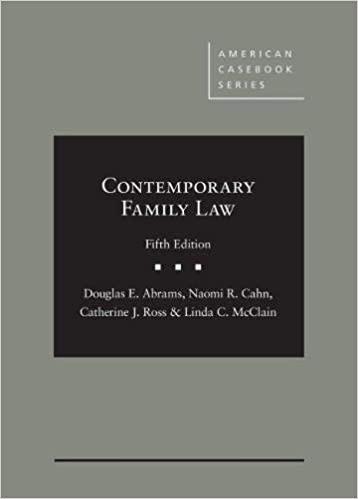Question
Green was a real estate developer who was president and part-owner of a Synvest Real Estate Trust (Synvest). Synvest's practice was to hold undeveloped property
Green was a real estate developer who was president and part-owner of a Synvest Real Estate Trust (Synvest). Synvest's practice was to hold undeveloped property in its own name while it arranged construction financing, then transfer the property to a newly created entity once the funds had been secured and development could begin. In the course of this business, Synvest came to own certain properties that it prepared for construction and conveyed to a new entity known as River Walk Development (Riverwalk I). In 2002, Ebenezer United Methodist Church (EUMC) purchased a 50 percent interest in Riverwalk I for $250,000, and construction commenced soon afterwards.
page 518
At some point in time before EUMC completed its investment in Riverwalk I, it learned that Synvest had come to own a new 32-acre parcel now at the center of this dispute and six additional lots in the same county as Riverwalk I. In 2003, Synvest formed River Walk Development Phase Two (Riverwalk II), which purchased the 32-acre parcel later that month. In 2004, Green caused Riverwalk I, Riverwalk II, and a third entity to enter into a line-of-credit agreement for $2.1 million for the three entities, collectively.
Riverwalk I developed and sold several units and conveyed the proceeds to EUMC. Eventually Synvest repurchased EUMC's interest, which yielded EUMC a profit of $30,000 on its $250,000 investment. Only after this business had concluded did EUMC learn of the line-of-credit agreement that had been tied to the Riverwalk I assets. EUMC filed suit against Green, Synvest, and Riverwalk II, alleging that they violated the corporate opportunity doctrine by failing to disclose the additional real estate transaction involving a new, 32-acre parcel, transferring it secretly to Riverwalk II, a new entity solely owned by Green. EUMC claimed that it should share in any profits of Riverwalk II. The trial court ruled in favor of Green/Riverwalk II and EUMC appealed.
SYNOPSIS OF DECISION AND OPINION The Maryland Court of Special Appeals upheld the trial court's judgment in favor of Green/Riverwalk II. While the court acknowledged that Green owed fiduciary duties to Riverwalk I and the other members, including the duty not to exclude principals from corporate opportunities, the court used the reasonable expectations test to determine if the corporate opportunity was usurped. It held that a reasonable expectation or interest in a corporate opportunity requires something more than mere proximity of geography, management, or finance.
WORDS OF THE COURT: Reasonable Expectations Test "This test focuses on whether the corporation could realistically expect to seize and develop the opportunity. If so, the director or officer may not appropriate it and thereby frustrate the corporate purpose. If the opportunity is a corporate one, then the director or officer to whom it is presented or who becomes aware of it must first present it to the corporation, before pursuing it himself. Only if the corporation rejects the opportunity may a director or officer exploit it for his own benefit.... [P]rojects related by management are not automatic mutual corporate opportunities. Joint financial risk is simply too common to give rise to any particularized interest or expectancy."
Case Questions
- Why did EUMC believe that it was entitled to become a partner in Riverwalk II?
- EUMC reaped a substantial profit from its Riverwalk I investment. Should that be a factor in the court's analysis? Why or why not?
- Focus on Critical Thinking: What other fiduciary duties may Green have breached given these facts? Explain. Could Green assert the business judgment rule as a defense?
- citations and references should be properly cited
Step by Step Solution
There are 3 Steps involved in it
Step: 1

Get Instant Access to Expert-Tailored Solutions
See step-by-step solutions with expert insights and AI powered tools for academic success
Step: 2

Step: 3

Ace Your Homework with AI
Get the answers you need in no time with our AI-driven, step-by-step assistance
Get Started


